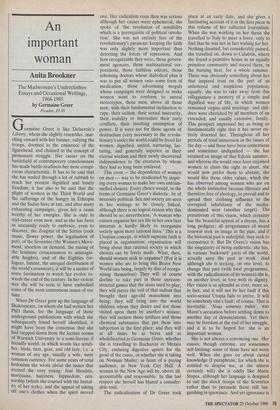An important woman
Anita Brookner
The Madwoman's Underclothes: Essays and Occasional Writings, 1968-1985 by Germaine Greer
Picador, f9.95
Germaine Greer is like Delacroix's Liberty, whom she slightly resembles, mar- ching onward with her banner, rallying the troops, doomed to the eminence of the figurehead, and chained to the concept of permanent struggle. Her career on the battlefield of contemporary consciousness has made battle-readiness her most conspi- cuous characteristic. It has to be said that she has waded through a lot of rubbish to reach her present dignified and lonely freedom; it has also to be said that the plight of women in the Third World and the sufferings of the hungry in Ethiopia and the Sudan have at last, and after many exhausting campaigns, given her a cause worthy of her energies. She is only in mid-career even now, and as she has been so uncannily ready to embrace, even to discover, the Zeitgeist of the Sixties (rock music, flower power, the legalisation of pot), of the Seventies (the Women's Move- ment, abortion on demand, the raising of the feminine consciousness to unimagin- able heights), and of the Eighties (re- fugees, famine, the unequal distribution of the world's resources), it will be a matter of some fascination to watch her evolve to- wards the end of the century. In her violent way she will be seen to have embodied some of the most contentious issues of our time.
When Dr Greer gave up the language of Shakespeare, on whom she had written her PhD thesis, for the language of those underground publications with which she subsequently found herself identified, it might have been the consensus that she had stepped down from the lecture rooms of Warwick University to a semi-literate if friendly world, in which words like scrub- ber, birds, fuzz, gear, and old lady, i.e. a woman of any age, usually a wife, were common currency. For some years of total hedonism she wrote about the issues that excited the very young: Jimi Hendrix, marijuana, hairiness, hippiedom, cen- sorship (which she courted with the brutal- ity of her style), and the appeal of taking off one's clothes when the spirit moved one. Her radicalism even then was serious although her causes were ephemeral; she spoke of 'the revolution of sensibility which is a prerequisite of political revolu- tion'. She was not entirely free of the revolutionary's paranoia: keeping the faith was only slightly more important than detecting the forces of repression. And how recognizable they were, those govern- ment agencies, those multinational cor- porations, those faithless editors, those scheming doctors whose diabolical plan it was to put all women onto some form of medication, those advertising moguls whose campaigns were designed to make women want to conform to unreal stereotypes, those men, above all those men, with their fundamental inclination to rape, their sadism, their sexual insecurity, their inability to internalize their early conflicts, their insulting assumption of power. lilt were not for these agents of destruction (very necessary to the revolu- tionary's code) the world could be freed for women, dignified, united, nurturing, lac- tating, and generally superior in their eternal wisdom and their newly, discovered independence to the creatures by whom they had so long been enslaved.
This error — the dependence of women on men — was to be eradicated by inspir- ing every woman to make her own untram- melled choices. Every choice would, in the terms of Germaine Greer's dialectic, be of necessity political. Sex and society are seen in her writings to be closely linked, although there is no logical reason why this should be so; nevertheless, 'A woman who cannot organize her sex life in her own best interests is hardly likely to reorganize society upon more rational lines.' This is a Utopian concept, in which supreme faith is placed in organisation; organisation will bring about that rational society in which choices can be freely made. What, then, should women seek to organise? (For it is women who are to bring this Brave New World into being, largely by dint of reorga- nising themselves) They will of course decline to take part in those unrecon- structed games that the sexes used to play; they will pierce the veil of that sadism that brought their age-old masochism into being; they will bring into the world children whom they desire and not those visited upon them by another's misuse; they will eschew those artifices and those chemical substances that put them into subjection in the first place; and they will at all times be as brave and as wholehearted as Germaine Greer, whether she is travelling to Bucharest or Mexico City, enduring digestive upsets for the good of the cause, or whether she is taking on Norman Mailer, in front of a paying audience, in New York City Hall. A woman in the New Age will be, above all, accountable and responsible. In this last respect she herself has blazed a consider- able trail.
The radicalisation of Dr Greer took place at an early date, and she gives a fascinating account of it in the first piece in this volume of her collected journalism. When she was working on her thesis she travelled to Italy to meet a lover, only to find that he was not in fact waiting for her. Nothing daunted, but considerably pained, she travelled on, down to Calabria, where she found a primitive house in an equally primitive community and stayed there, in the burning heat, for a whole summer. There was obviously something about her that inspired trust on the part of an unlettered and suspicious population; equally, she was to take away from this villeggiatura a memory of a simple and dignified way of life, in which women remained virgins until marriage, and chil- dren were cherished by all members of an extended, and usually extensive, family. This prospect impressed her as being so fundamentally right that it has never en- tirely deserted her. Throughout all her periods of total immersion in the issues of the day — and these have been contentious and sometimes undignified — she has retained an image of that Edenic summer, and whereas she would once have enjoined women to claim the right to abort, she would now prefer them to abstain; she would like those older values, which she has observed among women who are on the whole instinctive because illiterate and therefore free of ideology, to prevail and to spread their civilising influence to the corrupted inhabitants of the media- dominated west (another target). The primitivism of this vision, which certainly has the beautiful appeal of a dream, has a long pedigree; all programmes of moral renewal seek an image in the past, and if the historical past is unhelpful, may seek to reconstruct it. But Dr Greer's vision has the singularity of being authentic: she has, in various 'backward' parts of the world, actually seen the past at work. And although she is seeking, on one level, to change that past (with food programmes, with the radicalisation of its women) she is, on another level, in love with its dignity. Her vision is as splendid as ever, more so, in fact, and it will not be her fault if this socio-sexual Utopia fails to arrive. It will be somebody else's fault, of course. That is inevitable. 'Nous sommes trahis', was Marat's accusation before settling down to another day of denunciations. Yet there may be freedom at the end of her struggle, and it is to be hoped for: she is an important woman.
She is not always a convincing one. Her causes, though extreme, are sometimes self-limiting; some of them have not worn well. When she goes on about carnal knowledge (I paraphrase, for which she is entitled to despise me, as she almost certainly will) she is oddly like Marie Stopes, although her language is designed to suit the shock troops of the Seventies rather than to persuade those still lan- guishing in ignorance. And yet ignorance is really her preoccupation: she must have been a marvellous teacher. Those of her causes that have worn well have passed into the currency of our lives. The Female Eunuch, devised to dispel that very ignor- ance and promoted with passionate convic- tion, can have left few thinking women untouched. She is by now so identified with her causes that reactions to her are worth monitoring. The English on the whole tend to like sharp larky women and Germaine Greer is unfashionably serious. She is serious about everything that impinges on her own deep feeling, and that is another unassimilable trait. She may not have been well served by this comparatively prema- ture publication of her ephemeral writings. She has more work to do, and what comes next may be the most fascinating episode of all.



























































 Previous page
Previous page